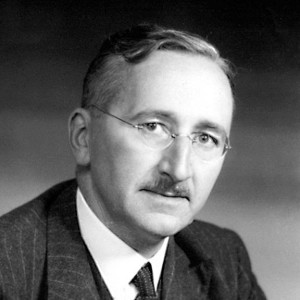Friedrich Hayek quotes - page 5
My life has been dominated by my differences with John Maynard Keynes. That turns almost wholly on the - I believe, false - conviction that there is a simple relationship between aggregate demand for consumer goods and the volume of employment. Keynes was one of the most intelligent people I knew but he understood very little economics. He must not be blamed for his disciples. He knew the danger of inflation.

Friedrich Hayek
The human groups have been selected for the effects of their habitual practices, effects of which the individuals were not and could not be aware. Customs are mostly group properties, beneficial only if they are common properties of its individual members but referring to reciprocal action. Morals have not only been designed by man, but man also usually does not understand their reason.

Friedrich Hayek
[Estonian Prime Minister] Mart Laar came to my office the other day to recount his country's remarkable transformation. He described a nation of people wh are harder-working, more virtuous - yes, more virtuous, because the market punishes immorality - and more hopeful about the future than they've ever been in their history. I asked Mr. Laar where his government got the idea for these reforms. Do you know what he replied? He said, "We read Milton Friedman and F. A. Hayek".

Friedrich Hayek
As the title of his 1941 book indicates, the theory of capital lay at the heart of his theory of the cycle. The reason is that he attributes the cycle not to changes in aggregate demand, or even to changes in the quantity of capital, but to changes in the structure of production and hence the structure of the capital stock. In this, his theory was highly unusual: one of the reasons for his failure to engage more effectively with Keynes was the latter's inability to see how the theory of capital could be of any importance for the cycle. Because the theory of capital is so central, and because it is so complex, it needs to be explained carefully. After that, the rest of his theory falls into place comparatively easily.

Friedrich Hayek
Altruism is an instinct we've inherited from the small society where we knew for whom we work, whom we serve. When you pass from this, as I like to call it, 'concrete society', where we are guided by what we see, to the abstract society which far transcends our range of vision, it becomes necessary that we are guided not by the knowledge of the effect of what we do, but by some abstract symbols. Now, the only symbol which tells us where we can make the best contribution is profit. And in fact by pursuing profit, we are as altruistic as we can possibly be, because we extend our concern to people who are beyond our range of personal conception. This is a condition which makes it possible to produce what I call an extended order, an order which is not determined by our aim, by our knowing what are the most urgent needs, but by an impersonal mechanism which by a system of communication puts a label on certain things which is fully impersonal.

Friedrich Hayek
Whereas, in fact, specialised students, even after generations of effort, find it exceedingly difficult to explain such matters, and cannot agree on what are the causes or what will be the effects of particular events. The curious task of economics is to demonstrate to men how little they really know about what they imagine they can design.
To the naive mind that can conceive of order only as the product of deliberate arrangement, it may seem absurd that in complex conditions order, and adaptation to the unknown, can be achieved more effectively by decentralizing decisions and that a division of authority will actually extend the possibility of overall order. Yet that decentralization actually leads to more information being taken into account.

Friedrich Hayek
At Chicago, Hayek put aside his more technical economic work for the development of a social and political theory that became in time the most ambitious and complete synthesis to emerge from the ranks of the post-war Right. Among its themes - the overriding significance of the rule of law, the need for social inequality, the function of unreflective tradition, the value of a leisured class - were many cultivated by Strauss across the campus. Neither thinker, however, ever referred to the other. Did temperamental antagonism, or intellectual indifference, dictate the silence? Whatever the case, latent tensions of outlook between them were to find expression in due course. Schmitt, on the other hand, was never far from Hayek's mind – standing for the prime example of a skilled jurist whose sophistry helped to destroy the rule of law in Germany, yet a political theorist whose stark definitions of the nature of sovereignty and the logic of party, at any rate, had to be accepted.

Friedrich Hayek
The great theme of his remarkable explorations in intellectual history is the danger of all constructivism, the belief that we can deliberately design social arrangements which will be better than those we unwittingly hit upon. Paradoxically, however, the drive of Hayek's own work is itself characteristically that of a rationalist construction. Admiring David Hume and detesting Auguste Comte, his genius was to marry the sceptical insights of the one to more than a touch of the compulsive rigour of the other.

Friedrich Hayek
Though Hayek clearly allows for the possibility of a retreat from socialism, whether of the hot (command planning) or cold (welfare state) variety, and planning, Hayek's critics, apparently taking Hayek at his word, use 'inevitability' to refer to the outcome (a totalitarian polity) that, according to Hayek, is supposedly generated by the cumulative logic inherent to interventionist policy and welfare state practices. Though taking care to note that a change in policy may occur, Hayek apparently considers the logic of intervention as primarily nudging policy in one direction, necessitating ever-further government intervention.

Friedrich Hayek
The [seminar in economic theory conducted by Hayek at the L.S.E. in the 1930s] was attended, it came to seem, by all of the economists of my generation - Nicky [Kaldor], Thomas Balogh, L. K. Jah, Paul Rosenstein-Rodan, the list could be indefinitely extended. The urge to participate (and correct Hayek) was ruthlessly competitive.

Friedrich Hayek
No-one who knows Hayek's work can doubt that his attempt to restate liberal principles in a form appropriate to the circumstances and temper of the twentieth century has yielded a body of insights wholly comparable in profundity and power with those of his forebears in the classical liberal tradition.

Friedrich Hayek
He who states that markets cannot fail, that market failure is always the result of government intervention, is a dogmatist. How the hell would he know? Overall, Hayek was not a dogmatist, although in his writings there can be found traces of such a liberal utopianism. There we encounter the motto: "What is not supposed to be, must not be! And what must not be, is not!" To me, all isms are suspicious anyway. The sceptic in me asks: why should markets be more reasonable than other human institutions? And we can see it every day: markets are also imperfect, prone to error, and in need of repair, like everything else that man has created.

Friedrich Hayek
I've always thought, incidentally, that many of us should welcome the fact that...a particular policy idea we hold does have this adverse effect on the opinions of other people. I think this is a very good thing, because it means that those of us who hold our views have to be better to get recognized than people who hold the other views. And in the long run, what matters is the quality of people who propose the ideas and not their number and not their position. It is because it is the quality of these ideas that matters so much that Hayek's ideas have been so wide-spread and have had such an influence, and that you are now seeing the rise in the scientific as well as in the other parts of the world of more people of this particular kind of persuasion....
... I am one of those who has learned a great deal from Hayek. I hope he is as effective as I think he will be in his teaching in Germany, but I also hope that we will see him back here very often indeed.

Friedrich Hayek
At the time of his death, F.A. Hayek (1899–1992) was unquestionably the world's preeminent spokesman for classical liberalism and its most important thinker. He led an immensely productive life, over the course of which he made significant contributions to a variety of disciplines, among them economics, political and social theory, psychology, and the history of ideas.

Friedrich Hayek
The book, as it stands, seems to me to be one of the most frightful muddles I have ever read, with scarcely a sound proposition in it beginning with page 45, and yet it remains a book of some interest, which is likely to leave its mark on the mind of the reader. It is an extraordinary example of how, starting with a mistake, a remorseless logician can end up in bedlam.

Friedrich Hayek
I was 25 years old and pursuing my doctorate in economics when I was allowed to spend six months of post-graduate studies in Naples, Italy. I read the Western economic textbooks and also the more general work of people like Hayek. By the time I returned to Czechoslovakia, I had an understanding of the principles of the market. In 1968, I was glad at the political liberalism of the Dubcek Prague Spring, but was very critical of the Third Way they pursued in economics.

Friedrich Hayek
Friedrich Hayek
 Occupation: Austrian Economist
Occupation: Austrian Economist
Born: May 8, 1899
Died: March 23, 1992
Quotes count: 147
Wikipedia: Friedrich Hayek











